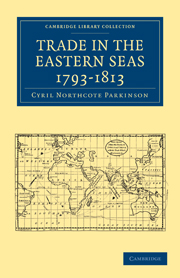Book contents
- Frontmatter
- Contents
- ILLUSTRATIONS
- PREFACE
- CHAPTER I THE INDIA HOUSE
- CHAPTER II BRITISH INDIA
- CHAPTER III TRADE TO THE EAST
- CHAPTER IV THE EASTERN SEAS
- CHAPTER V EAST INDIAMEN
- CHAPTER VI THE SHIPPING INTEREST
- CHAPTER VII THE MARITIME SERVICE
- CHAPTER VIII THE VOYAGE
- CHAPTER IX PASSENGERS
- CHAPTER X NAVAL PROTECTION
- CHAPTER XI THE COUNTRY TRADE
- CHAPTER XII THE END OF MONOPOLY
- NOTES
- BIBLIOGRAPHY
- INDEX
- I General Map
- II Chart of Winds
- Plate section
CHAPTER XII - THE END OF MONOPOLY
Published online by Cambridge University Press: 07 October 2011
- Frontmatter
- Contents
- ILLUSTRATIONS
- PREFACE
- CHAPTER I THE INDIA HOUSE
- CHAPTER II BRITISH INDIA
- CHAPTER III TRADE TO THE EAST
- CHAPTER IV THE EASTERN SEAS
- CHAPTER V EAST INDIAMEN
- CHAPTER VI THE SHIPPING INTEREST
- CHAPTER VII THE MARITIME SERVICE
- CHAPTER VIII THE VOYAGE
- CHAPTER IX PASSENGERS
- CHAPTER X NAVAL PROTECTION
- CHAPTER XI THE COUNTRY TRADE
- CHAPTER XII THE END OF MONOPOLY
- NOTES
- BIBLIOGRAPHY
- INDEX
- I General Map
- II Chart of Winds
- Plate section
Summary
The first serious attack on the Company's monopoly came from the handful of merchants living in India under the Company's own protection. The story of the campaign for Free Trade begins with the effort of these merchants to obtain admission to the trade with Europe. The basis of their prosperity was, as we have seen, the wealth of the Company's servants at Calcutta and, to a lesser extent, at Bombay. In the later years of our period there were, Wathen points out,
…five houses of agency…in Calcutta, circulating through their many ramified channels the life-blood of commerce, and at once affording an employment for native capital, yielding a large interest of eight per cent, to such Company's servants as left the produce of their hard-earned labours to increase in their hands, and making at the same time the rapid and princely fortunes of many an enterprising merchant, who has returned to his native land a prince in revenue, himself the architect of his fortunes.…
Some idea has already been given of the wealth made in India by individuals; and especially those in the Company's service. This wealth having been further increased by the type of investment Wathen describes, the problem arose as to how to send it to England when the time came for the owner to retire there. Originally, the transmission had been a very simple matter, for the fortunes acquired in India were neither numerous nor large.
- Type
- Chapter
- Information
- Trade in the Eastern Seas 1793–1813 , pp. 357 - 366Publisher: Cambridge University PressPrint publication year: 2010First published in: 1937



